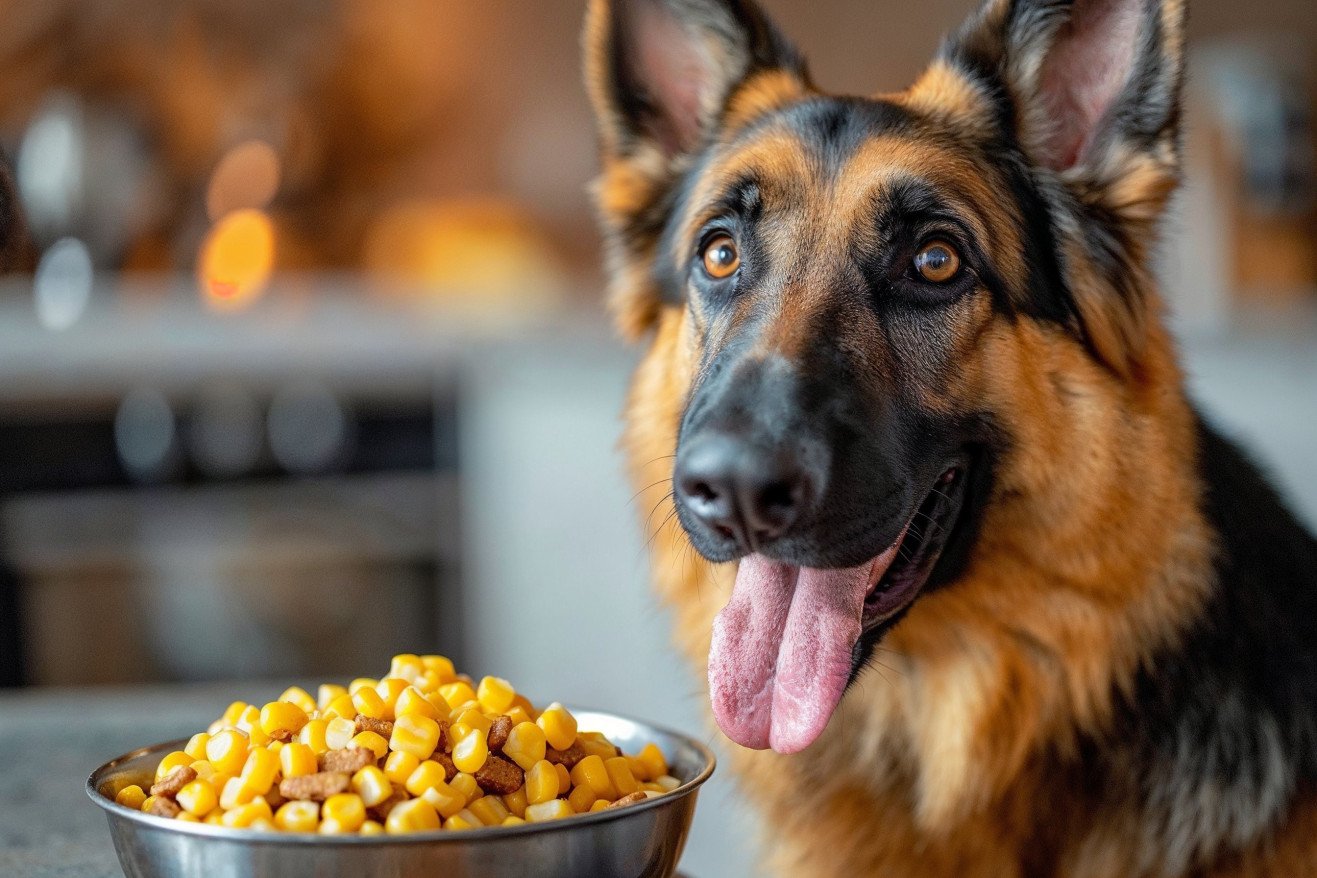Can Dogs Eat Corn? A Nutritional Guide for Pet Owners
25 January 2024 • Updated 28 January 2024

Corn is a dietary staple for many people, but can you share it with your furry friend? While it’s safe for dogs to eat corn and it can provide them with some nutritional benefits like protein, carbohydrates, and antioxidants, it’s important to make sure they only eat it in moderation and that it’s not on the cob, which can be a choking hazard and cause an intestinal blockage.
We will take a deep dive into a number of reputable sources, including information from veterinarians and nutritional data, to get a complete picture of what it means to feed corn to dogs. We will look at scientific research on how dogs digest and metabolize food and reference recommendations from animal nutrition professionals to assess the pros and cons of feeding dogs corn.
By the end of this article, you will know everything you need to know to determine whether corn can be a part of a healthy diet for your dog.
Can dogs eat corn?
Nutritional Profile of Corn for Dogs
Corn is a nutritious addition to a dog’s diet. It is a carbohydrate, which is an important source of energy for active dogs, and it is also a protein, which is important for muscle maintenance and repair. A study in PubMed found that dogs can digest corn well and that it is a good source of linoleic acid, an essential fatty acid that supports skin and coat health.
Corn is also a good source of antioxidants, including beta-carotene, vitamin E, and lutein, which help reduce oxidative stress and support the immune system. The digestibility of corn is improved when it is processed into cornmeal and corn gluten meal, which are commonly used in dog food. These processed forms of corn are not only more digestible, but they also help with the extrusion process of kibble production, according to Pumpkin.
That said, the amount of corn in a dog’s diet should be controlled. While it is nutritious, it should not be the primary source of protein. While it’s important to understand the nutritional benefits of corn, it’s also important to understand how corn is digested in a dog’s body to make sure it is added to their diet in a way that is healthy and doesn’t cause any problems.
Can Dogs Digest Corn?
When properly prepared, dogs can digest corn. As Dr. Jason W. Gagné, a board-certified veterinary nutritionist, notes, properly cooked corn can provide a source of carbohydrates, essential fatty acids, and protein that dogs can digest.
That said, there are some potential downsides to feeding dogs corn. For example, some dogs may have trouble digesting corn or even be allergic to it, although this is less common than allergies to other ingredients like beef or dairy, according to PetMD.
Corn should be added to a dog’s diet with caution. It should be introduced in small amounts, and dogs should be monitored for signs of intolerance, such as digestive issues or skin problems.
If a dog does have a reaction to corn, it’s important to talk to a vet. A vet can help determine if the corn should be avoided or if there are other issues at play.
It’s also important to note that while corn can be a healthy addition to a dog’s diet, it should be added in a way that’s consistent with the dog’s individual health and dietary needs.
Corn Allergies in Dogs: Symptoms and Prevalence
Corn is not one of the most common allergens in dogs, but it is possible for a dog to be allergic to corn. A corn allergy is an immunologic response to the proteins in corn and can cause a variety of symptoms, from skin problems to digestive issues.
While food allergies are relatively rare in dogs, affecting only about 1% of the dog population, they can be very uncomfortable for the dogs that have them, according to Today’s Veterinary Practice.
Corn allergies are less common than allergies to proteins like beef and dairy. If a dog is allergic to corn, the most common symptoms are non-seasonal itching and digestive issues, which are the most common symptoms of food allergies. Corn allergies are diagnosed through a veterinarian-supervised elimination diet and a food challenge to confirm the allergy.
If a dog is diagnosed with a corn allergy, their owner can feed them other sources of carbohydrates, such as rice or sweet potatoes. A study published in BMC Veterinary Research found that cornstarch, which is less allergenic than corn flour, may be better tolerated by dogs with allergies.
However, it’s important to work with a veterinary nutritionist to make sure that the diet is nutritionally complete and balanced for a dog with a corn allergy.
What Corn Does in Dog Food
Corn is a common ingredient in commercial dog food, and it is often referred to as a ‘filler’ in dog food. However, the truth about corn is a bit more complicated. According to the Dog Food Advisor, corn has a low to moderate glycemic index and is not a common allergen in dogs, with corn allergies being relatively rare.
This goes against the idea that corn is a low-quality ingredient that is only added to pet food.
From a nutritional standpoint, corn supplies important carbohydrates, amino acids, and fatty acids that are important components of a well-rounded canine diet, according to Purina Veterinary Diets. The nutrients in corn are also made more bioavailable and easier for dogs to digest during the process of making dog food. In addition, corn is important in the kibbling process, which is used to make dry dog food.
The financial advantages of corn are also important. Corn is cheap and readily available, which makes it a cost-effective ingredient for pet food companies.
That said, if you’re considering a dog food that contains corn, it’s important to look past the ‘filler’ designation and evaluate the overall nutritional content and quality of the ingredients. High-quality dog foods that contain corn can help ensure that dogs get the energy and nutrients they need for a healthy, well-balanced diet.
How to Feed Your Dog Corn
If you want to feed your dog corn, there are a few things to keep in mind. The American Kennel Club recommends that treats, including corn, should make up no more than 10% of your dog’s daily caloric intake to ensure a well-rounded diet.
Make sure the corn is cooked and removed from the cob to avoid a choking hazard. Rover.com suggests rinsing canned corn to remove excess sodium and choosing fresh corn as a healthier option.
Both the American Kennel Club and Rogue Pet Science stress the importance of cooking corn to make it easier for dogs to digest. Don’t add any seasonings or butter, as plain corn is the best option for your dog. You can also mix cooked corn with other dog-safe foods, such as diced veggies or cooked chicken, to make a healthy and tasty treat.
As with any new food, including corn, make sure to introduce it to your dog slowly. After your dog eats corn, watch them for signs of an upset stomach or an allergic reaction, and talk to your vet if you have any concerns. By taking these precautions, you can make sure that feeding your dog corn won’t cause any problems and will keep your furry friend happy, healthy, and excited for more culinary adventures.
In Conclusion: Can Dogs Eat Corn?
In conclusion, corn is a healthy and nutritious option for dogs as long as it is fed in moderation and prepared properly. Corn contains important nutrients like protein, carbohydrates, and linoleic acid, all of which are important to a dog’s diet. Corn that is prepared properly is also more digestible, so it can be a good source of energy and nutrients for dogs.
Although corn allergies are not common in dogs, it’s still important to know the symptoms and talk to your vet if you think your dog has a food allergy. That said, the fact that corn is often used as a filler in commercial dog foods shouldn’t take away from the fact that it can be a nutritious ingredient as long as the food is nutritionally balanced.
As always, make sure to feed corn to your dog in moderation to avoid potential digestive problems or allergies. Make sure that the corn is prepared in a way that is safe for dogs and avoid the cob to prevent choking hazards. If you want personalized advice on what to feed your dog, talk to your vet.
When fed with care, corn can be a valuable part of a dog’s healthy, balanced diet that supports their overall health and wellness.


